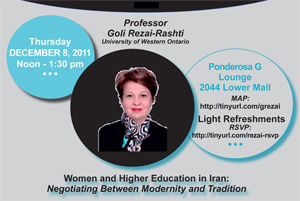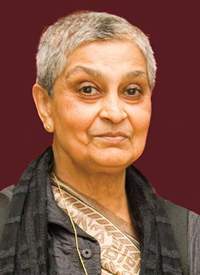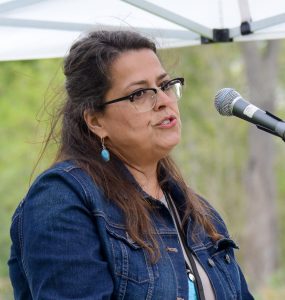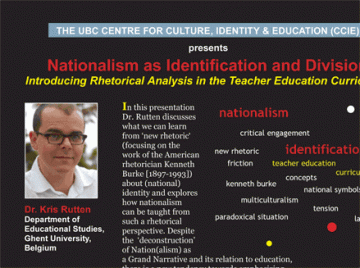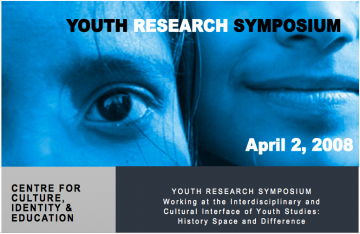Women and Higher Education in Iran: Negotiating Between Modernity and Tradition
Professor Goli Rezai-Rashti provides an analysis of women’s access to higher education in Iran, which has varied over the last 30 years, and their continuously limited participation in the job market.
Postcolonialism and Critical Pedagogy
The only activism I know
Keynote speaker: Gayatri Chakravorty Spivak, Columbia University
Panel Discussion: Sneja Gunew, Renisa Mawani, and Prabhsharanbir Singh
Service Learning for Social Justice and Cultural Studies Praxis
Cultural Studies Methodology, Sociality and the Praxis of Project Citizen
Introduction: Handel Wright, Linc Kesler, and Sunera Thobani
Keynote speaker: Awad Ibrahim, University of Ottawa
Panel Discussion: Shauna Butterwick, Maryam Nabavi, and Marilou Carrillo
Anti-racism and Critical Race Feminist Theory
Race, Space and Prostitution
Introduction: Handel Wright, Linc Kesler, and Sunera Thobani
keynote speaker: Sherene Razack, University of Toronto
Panel Discussion: Annette Henry, Indira Prahst, and Benita Bunjun.
Indigenous Praxis and World Majority Peoples’ Identity Politics
We Own Ourselves: The Role of Indigenous Knowledge Systems, Self-Definition and Self-Determination in Indigenous Justice
Introduction by Handel Wright, Linc Kesler, and Sunera Thobani
Panel Discussion by Rain Daniels, Dorothy Christian, and Charles Menzies.
Nationalism as Identification and Division Introducing Rhetorical Analysis in the Teacher Education Curriculum
In this presentation Dr. Kris Rutten discusses what we can learn from ‘new rhetoric‘ (focusing on the work of the American rhetorician Kenneth Burke [1897-1993]) about (national) identity and explores how nationalism can be taught from such a rhetorical perspective. Despite the ‘deconstruction’ of Nation(alism) as a Grand Narrative and its relation to education, there is a new tendency towards emphasizing national identity, caused by trends such as globalization and multiculturalism. In the language and literature teaching curriculum, this paradoxical situation often causes friction for teachers who are very often expected to teach standard language and national literature. Dr. Rutten’s claim is that rhetoric is a possible tool to deal with these tensions in the curriculum. He will focus on the rhetorical construction of Flanders, Belgium, as a case-study and will argue that Burke’s concepts are useful tools to make students ‘symbol-wise’: to understand the way national symbols work, and to develop critical engagement with, as well as on behalf of, those symbols.
The Freire Project talks to Handel Wright
Interview with Handel Wright –CCIE Director, Handel Wright talks to the Paulo and Nita Freire International Project for Critical Pedagogy about interculturalism versus multiculturalism, youth in Canada, USA and Europe, his relationship with Project founder Joe Kincheloe and critical pedagogy’s influence on his own work. (10 June, 2009)
Watch: “From the Margins to the Centre? Girlhood and the Contradictions of Femininity Across Three Generations” by Mary-Jane Kehily
New femininities suggest that young women are moving from the margins to the centre. No longer content with subordinate status in the bedroom or on the periphery of youth cultures, young women appear to have found their voice as the ‘can do’ girls of neo-liberalism. This paper charts the social change that has had a dramatic impact upon gender relations and particularly the emergence of new femininities that mark growing up girl as a distinctly different experience for young women in the contemporary period. Familiar tropes of new femininities position young women as agentic, goal-oriented, pleasure seeking individuals adept at reading the new world order and finding their place within it. Has femininity finally found a skin that fits or are there cracks in this unparalleled success story? The paper examines this question intergenerationally by looking at young women’s experience across time. Specifically, the paper will explore the implosion of the public-private spheres in relation to the experience of being a girl as articulated by three generations of women.
Watch: “Moral Panic in a New Age: Suspicion, Dread and Evolving Conceptions of Youth and the ‘Dangerous classes’ in Urban Space” by Joanne Dillabough
In this presentation I showcase the beginnings of a theoretical approach which attends to the spatial relationships operating between young people, new modes of urban surveillance within and outside schools, and the global problematic associated with moral panic operating in the affluent ‘West’.
Watch: “Learning to Protest: Youth Activist Struggles for Recognition and Symbolic Authority in a Neoliberal Moment” by Jackie Kennelly
This paper explores the material effects of an array of cultural and subcultural forces on three groups of urban Canadian young people: youth activists in Toronto, Montreal, and Vancouver. The main argument of the paper is that histories of liberal discourses, symbolic and material forms of racism, colonialism and class conflicts, as well as the contemporary ascendancy of neoliberalism, have created a specific cultural space that have identifiably shaped youth activist subcultures in Canada. The paper builds this argument on the basis of a year-long ethnography with 38 young people (ages 13-29) engaged in youth activist subcultures contesting globalization, war, poverty, and/or colonialism across Canada’s three largest cities. In the first section of this three-part exploration, I consider the influence of liberalism and neoliberalism, reading the pressures faced by young activists through the lens of these two ideological forces.
